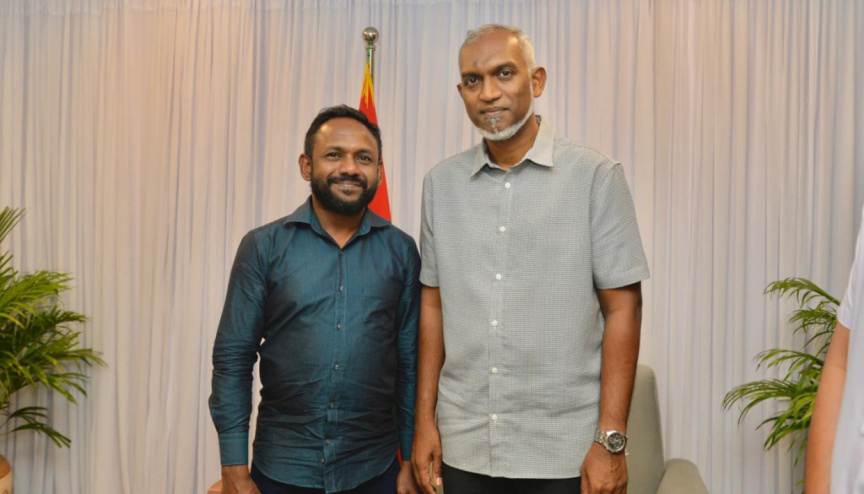
Mohamed Shaheed (L) with President Dr. Mohamed Muizzu (R).
The new judges to the High Court are scheduled to take their oath on Sunday, despite a case lodged with the Civil Court seeking to block the appointment of one of the two selected for the bench - Mohamed Shaheed, a senior activist at the ruling People’s National Congress (PNC), who up until recently, held the post of deputy minister at the Homeland Security Ministry.
The Judicial Service Commission (JSC) opened applications for the two vacancies at the High Court on July 10. The commission had not publicized the names of the 18 candidates who applied by the July 16 deadline until Wednesday, shortly before it held interviews and made the selections; Shaheed and Civil Court’s former judge Abdulla Jameel Moosa.
On Thursday, Ahmed Naushad, a senior public prosecutor who himself applied for the High Court, filed a case with the Civil Court contesting Shaheed’s appointment.
But despite the court case, the JSC has decided to hold the oath taking ceremony for the judges on Sunday night. The ceremony is scheduled to be held at the Supreme Court.
Naushad, who has asked the Civil Court for an injunction to suspend the appointment until the court makes a final decision, believes the decision to choose Shaheed over far more educated candidates, including sitting judges, to be a grave injustice.
"Looking at the education and experience of the candidates who applied, I believe this is a grave injustice. This is the reason I filed this case," Naushad explained to Sun.
Shaheed had been highly visible in campaign activities by PNC during both the 2023 presidential election as well as the 2024 parliamentary election. He was also often seen defending the PNC administration in various platforms during his tenure as deputy minister – a post that he announced he resigned from via a Facebook post on July 10 - which also happened to be the day JSC opened applications for the High Court.
The two slots in the High Court’s bench opened after the court’s former chief judge Hussain Shaheed and judge Mohamed Saleem were appointed to the Supreme Court.
Shaheed was appointed to the Supreme Court following the resignation of Husnu Al-Suood, while Saleem, along with former High Court judge Abdulla Hameed, were appointed to the top court following the controversial dismissal of justices Dr. Azmiralda Zahir and Mahaz Ali Zahir in May, despite serious concerns regarding lack of due process and procedural fairness in the disciplinary proceedings against them by the JSC.
During his 2023 presidential campaign, President Dr. Mohamed Muizzu had vowed to free the judiciary from political influence.
However, the departure of all three justices came after they were suspended by the JSC in February, citing an ongoing investigation by the against them by the Anti-Corruption Commission (ACC). All three were hearing a case challenging the controversial move by the ruling People's National Congress (PNC) to write anti-defection clauses into the Maldivian constitution. It had come less than one hour ahead of a hearing scheduled at the Supreme Court regarding a request for an injunction to suspend the enforcement of the controversial anti-defection clauses. It also came shortly after the ruling PNC used its supermajority in the Parliament to push through amendments to the Judicature Act to downsize the Supreme Court bench from seven to five justices - a bill that was later tabled following public backlash.
Suood resigned from the top court in protest of JSC’s decision, and the commission later opened misconduct cases against Azmiralda and Mahaz, accusing them of conspiring to influence the Criminal Court.
The case against them stemmed from the allegation that they exerted their influence over the Criminal Court to secure the release of Azmiralda’s husband, Dr. Ismail Latheef, an anesthesiologist, who was arrested during a police raid on a massage parlor in Male’. However, Criminal Court judge Ibrahim Zihunee’s statement to JSC shows Mahaz had called him after Latheef was already released from police custody.
Meanwhile, the then-assistant registrar of High Court, Hussain Mohamed Haneef, who testified against Azmiralda and Mahaz at the JSC, was recently appointed to a senior position at state-run utility company, Fenaka Corporation.
President Muizzu, whose administration has been accused of deliberately undermining the country’s judicial independence, denied these claims in a press briefing on May 3, describing the events that fueled the allegations as mere “coincidences.”
The JSC has come under fire from both local and international organizations over its decision to push for the dismissal of the Supreme Court justices. On June 4, multiple international bodies sent an open letter to President Muizzu urging him to suspend the impeachment of Supreme Court judges, citing reports of serious procedural concerns.